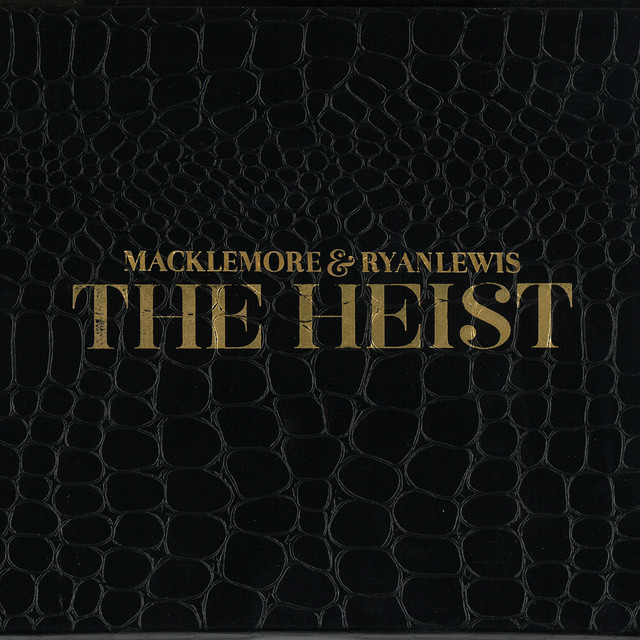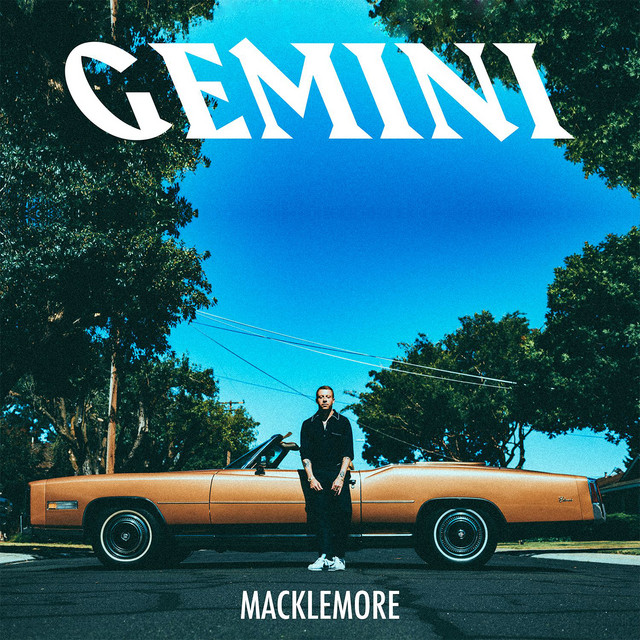Released: 2012
Label: Macklemore
Featuring: Ryan Lewis, Ray Dalton, Wanz, Buffalo Madonna, Mary Lambert, Allen Stone, The Teaching, Hollis, ScHoolboy Q, Ab-Soul, Evan Roman, Eighty4 Fly, Ben Bridwell
Before ‘Macklemore & Ryan Lewis’ became a household name with their infectious hits and thrift shop swagger, they were just two independent artists from Seattle, grinding and crafting their unique blend of poetic candidness and boom-bap production that would ultimately change their lives and reshape the hip-hop landscape. The pinnacle of this transformation took shape in their 2012 studio album, ‘The Heist,’ a powerful testament to their journey and a beacon for independent artists worldwide. Released by their label, Macklemore, this album catapulted the duo into the limelight, solidifying their place in the pantheon of hip-hop greats.
With an array of guest contributions including Wanz, Ray Dalton, Mary Lambert, and ScHoolboy Q, among others, ‘The Heist’ marries diverse influences to create a rich, multi-layered sound that transcends traditional genre boundaries. From stirring anthems like ‘Can’t Hold Us’ and ‘Ten Thousand Hours’ to the socially conscious strain of ‘Same Love,’ Macklemore and Lewis seamlessly weave personal experiences, societal issues, and tireless ambition into a compelling audio narrative. Tune after tune, ‘The Heist’ captures the ups and downs of their journey, embodying the essence of hip-hop: storytelling, grit, and the relentless quest for self-expression and authenticity.
Throughout its 18 tracks, ‘The Heist’ offers an intimate window into Macklemore’s complex world. It’s a triumphant declaration of victory, an open ledger of demons faced, and a nuanced critique of societal norms, all against a backdrop of stirring music crafted by the genius of Ryan Lewis. From the infectious swagger of ‘Thrift Shop’ to the raw introspection of ‘Starting Over,’ each song is a testament to their craft, their journey, and their unwavering commitment to truth. So let’s get into it. From ‘Ten Thousand Hours’ to ‘Victory Lap,’ we are breaking down ‘The Heist’ by ‘Macklemore.’
1 Ten Thousand Hours
Features: Ryan Lewis
Drenched in the sweat of perseverance, this track isn’t just about the hustle; it’s a deep dive into the psyche of an artist determined to leave a mark. Macklemore’s lyrics reflect a journey of self-discovery, resilience, and the relentless pursuit of excellence, encapsulated perfectly in lines like, “The greats weren’t great because at birth they could paint / The greats were great because they paint a lot.” It’s a nod to Malcolm Gladwell’s 10,000-hour rule from “Outliers,” suggesting that mastery in any field is about hard work and dedication, not inherent talent. This track is a declaration that true artistry is earned through tenacity, a sentiment that resonates deeply within the hip-hop ethos of creating something monumental from nothing but raw talent and sheer will.
2 Can’t Hold Us
Features: Ryan Lewis, Ray Dalton
Ray Dalton is a thunderous anthem of independence and triumph that defines Macklemore & Ryan Lewis’s explosive journey in the hip-hop arena. This track epitomizes the hustle with its potent blend of gritty resilience and euphoric celebration. Macklemore delivers bars that speak to grinding from the bottom with an unyielding determination to break the mold, asserting, “Trust me, on my I-N-D-E-P-E-N-D-E-N-T shit, hustlin’.” It’s not just a song; it’s a rallying cry for the underdogs and the dreamers, believing that no ceiling can contain their ambition. The blend of Ray Dalton’s soul-stirring chorus and the energetic production by Ryan Lewis amplifies this message, making “Can’t Hold Us” a timeless reminder that with grit and tenacity, any barrier can be shattered.
3 Thrift Shop
Features: Ryan Lewis, Wanz
At its core, the song challenges mainstream materialism, flipping the script on high-end fashion culture by celebrating the art of deal-hunting in the thrift shop aisles. With lines like “I’m gonna pop some tags / Only got 20 dollars in my pocket,” Macklemore captures the essence of finding treasure in another man’s trash, making it cool to be cost-conscious. But it’s the line, “50 dollars for a T-shirt, that’s just some ignorant bitch shit,” that delivers the knockout punch, critiquing consumerism’s absurdity with razor-sharp wit. “Thrift Shop” isn’t just entertaining; it’s a commentary on society’s values, wrapped up in a catchy hook that had everyone singing along while subtly schooling them on the virtues of budget savviness.
4 Thin Line
Features: Ryan Lewis, Buffalo Madonna
A raw exploration of the complexities inherent in love and relationships, especially under the glaring lights of fame. It dives deep into the emotional turmoil and detachment that can arise, particularly when one partner is steeped in the chaotic lifestyle of the music industry. Macklemore’s candid verses weave through the highs and lows of a relationship strained by his career’s demands, articulating a narrative that is as heart-wrenching as it is relatable. The standout line, “I swear to God, I wish that I could Photoshop the scars off,” underscores the desperate yearning for a clean slate, free from the emotional baggage that taints their relationship. The song masterfully captures the feeling of being caught in a cycle of love and pain, marking a poignant moment in the album where personal reflection leads to the inevitable conclusion that sometimes, letting go is the only way forward.5 Same Love
Features: Ryan Lewis, Mary Lambert
The track boldly confronts the hip-hop community and society at large for their part in perpetuating discrimination against the LGBTQ+ community. It’s a call to arms for equality, respect, and love, underscored by Macklemore’s reflections on his own misconceptions about sexuality and the harmful impact of hate speech. One line that hits particularly hard is, “If I was gay, I would think hip-hop hates me / Have you read the YouTube comments lately?” It highlights the stark reality of being LGBTQ+ in a culture that often glorifies machismo and marginalizes those who don’t fit into a heteronormative mold. Through its compelling narrative and Lambert’s haunting chorus, the song advocates for a world where love transcends sexual orientation, pushing the envelope in a genre not known for its sensitivity to such issues.
6 Make The Money
Features: Ryan Lewis
The track is a heartfelt testament to integrity over income, emphasizing the importance of authenticity in an industry often blinded by bling. Macklemore reflects on his journey, navigating the temptations that come with success, and the realization that true satisfaction comes not from material wealth but from the art itself and staying loyal to one’s roots. A standout line, “Make the money, don’t let the money make you. Change the game, don’t let the game change you,” encapsulates the song’s essence and serves as a powerful mantra for anyone looking to maintain their soul in the face of potential sell-out status. This line isn’t just a hook; it’s a declaration of Macklemore’s commitment to his craft and authenticity, offering a blueprint for balancing artistic integrity with commercial success.
7 Neon Cathedral
Features: Ryan Lewis, Allen Stone
Macklemore’s illustrative lyrics depict a dive bar as a place of worship, where the congregation finds solace in their vices rather than traditional religious venues. The song poignantly captures the struggle between wanting to overcome one’s demons and the comforting familiarity of succumbing to them. A standout line, “I read the Bible, but I forgot the verses. The liquor store is open later than the churches,” sharply critiques the accessibility and allure of indulgence over spiritual salvation. This line highlights the internal conflict and societal observations that make the track resonate deeply, placing the listener right beside Macklemore in the neon-glow sanctuary where he seeks absolution.
8 BomBom
Features: Ryan Lewis, The Teaching
9 White Walls
Features: Ryan Lewis, Hollis, ScHoolboy Q
The track grooves on the nostalgia of old-school hip-hop and the luxurious feel of having made it, regardless of the roots you’ve sprung from. It’s a tip of the hat to the rags-to-riches story many dream of, laid over a backdrop of smooth beats and catchy hooks. Macklemore, with ScHoolboy Q and Hollis, crafts a narrative that’s both personal and universal, a story about aspiration, appreciation, and the pure pleasure of driving something that signifies achievement. ScHoolboy Q adds depth with his own reflections on youthful rebellion and the intoxicating mix of success and excess. A standout line, “I got that off-black Cadillac, midnight drive,” perfectly captures the essence of the track – a love letter to the journeys we embark upon and the dreams we chase, made tangible through the steering wheel of a cherished ride.
10 Jimmy Iovine
Features: Ryan Lewis, Ab-Soul
This song cleverly uses a metaphorical break-in to Interscope Records as a storyline to critique the music industry’s iron grip on artists, echoing the sentiment of countless others who’ve felt swindled by flashy deals. Through an audacious plan to “steal” a record deal, the lyrics unfold the stark reality behind the glamorous veneer of record contracts. A standout line that hits hard is, “Rather be a starving artist than succeed at getting fucked,” laying bare the choice Macklemore feels he faces: selling out for financial security or staying true to his art at the risk of remaining unrecognized. The narrative strength of this track lies in its honesty and the acknowledgment of the music industry’s often predatory nature, making “Jimmy Iovine” a bold statement on artistic integrity and the lengths to which artists will go for their dreams.
11 Wing$
Features: Ryan Lewis
Macklemore weaves a tale that begins in childhood, capturing the allure and prestige attached to owning a coveted pair of sneakers. The enthralling storytelling captures a universal tale of desire, societal pressure, and the lengths to which individuals will go to fit in. However, the song pierces deeper, critiquing the very fabric of consumerism and its impact on our values. A standout line, “Will I stand for change, or stay in my box? These Nikes help me define me, but I’m trying to take mine off,” encapsulates the inner conflict and the realization of being ensnared by materialism. It’s a powerful condemnation of how brands like Nike have shaped identities, hinting at a longing to break free from these chains.
12 A Wake
Features: Ryan Lewis, Evan Roman
Macklemore & Ryan Lewis, alongside Evan Roman, dive headfirst into the complexities and contradictions of the millennial generation, navigating themes such as recklessness, substance abuse, social activism, and the digital disconnect in modern relationships. With a raw honesty, Macklemore reflects on societal issues, personal flaws, and the quest for authenticity in an era overwhelmed by superficial connections and escapism. The song is a wake-up call, urging listeners to open their eyes to the realities that surround them and to find depth in love and connection. A standout hard-hitting line, “But you don’t even have a fuckin’ song for radio / Why you out here talkin’ race, tryin’ to save the fuckin’ globe,” poignantly captures the tension between wanting to engage in meaningful activism and the fear of alienation or misunderstanding from the audience. It underscores the artist’s struggle with the expectation to remain silent on pressing societal issues for fear of backlash or misinterpretation, highlighting the delicate balance between personal conviction and public perception.13 Gold
Features: Ryan Lewis, Eighty4 Fly
With a vibe that’s both celebratory and reflective, they critique society’s obsession with material wealth while participating in its spoils. Through vivid imagery of everything from gold volcanoes to Dookie Ropes on pharaohs, they paint a picture of a world obsessed with surface-level beauty and status symbols. Yet, amidst this golden haze, they propose a radical generosity—giving it all away, disrupting societal norms about wealth. A standout line, “Ditch Jesus, In Gold I Trust,” flips the script on spiritual beliefs versus material worship, highlighting the modern idolatry of wealth. The track oscillates between glorifying gold’s allure and questioning the value we assign to it, making listeners ponder what truly glitters in their lives.
14 Starting Over
Features: Ryan Lewis, Ben Bridwell
Laying bare the tumult of relapsing after public sobriety, provoking a heart-wrenching dialogue on addiction’s grip and the complexities of recovery. This track isn’t just music; it’s a confession booth that resonates with stark honesty and vulnerability. A standout hard-hitting line, “If I can be an example of gettin’ sober, then I can be an example of startin’ over,” underscores the essence of human resilience and redemption. Macklemore doesn’t just share his fall from grace; he lights a path back, acknowledging the power of sobriety’s everyday battle and the strength found in admitting failure and fighting back. Through his journey, he addresses the weight of expectation, the personal toll of his public persona, and the universal struggle against personal demons, making “Starting Over” a beacon of hope for anyone caught in the throes of addiction.15 Cowboy Boots
Features: Ryan Lewis
Narrating tales from Capitol Hill, where the reality blurs amid the neon glow of dive bars and the camaraderie of the disenchanted, this track is a testament to the ephemeral nature of youth, the yearning for immortalization of moments, and the harsh wake-up to life’s inexorabilities. Through a haze of PBR and the clatter of cowboy boots, Macklemore weaves a narrative that’s both a celebration and a lament, encapsulated in the standout line “Hold the night for ransom as we kidnap the memories.” This line encapsulates the desperate grasp for fleeting moments, a desire to pause the inexorable forward push of time—a recurring theme resonating with anyone who’s ever wanted to capture the essence of the “now” and hold it, unchanging, forever.
16 Castle
Features: Ryan Lewis
The track is a bold celebration of imagination, where pirate ships and wizard sleeves aren’t just fairy tales – they’re invitations to a world where anything goes, especially in Macklemore’s castle. “This is for the freaks and for my magicians, booty clap and lap dancing technicians,” epitomizes the vibe of the song, laying out a welcome mat for all the eccentric and the creative souls to come together and party. It’s a dazzling mix of humor, bravado, and the kind of wild energy that makes hip-hop such a dynamic canvas for storytelling. Macklemore isn’t just hosting a party; he’s creating a haven for the misfits and dreamers, proving that hip-hop can indeed be the most magical place on Earth.
17 My Oh My
Features: Ryan Lewis
It’s a tribute to the late Mariners announcer Dave Niehaus, whose voice narrated the significant moments of Macklemore’s childhood, paralleling the collective memory of a city unified by their team’s victories. Through the imagery of dusty garages, worn baseball gloves, and the ritual of listening to the games, Macklemore bridges personal history with communal sentiment, celebrating the simple yet profound joys of being a fan. A standout line, “This is what you make of it, yeah, we play to win / Live it like we’re under the lights of the stadium,” captures the essence of striving for greatness, whether on the diamond or in life’s pursuits, reminding us of the power of legacy and the indelible imprint of our heroes.
18 Victory Lap
Features: Ryan Lewis
Macklemore recounts his humble beginnings and the tireless grind towards recognition, emphasizing the power of perseverance, self-belief, and the significance of staying true to one’s roots and ethical compass. The track resonates with anyone who has ever dreamed big, faced setbacks, and pushed through regardless. A standout line, “And they say, ‘Don’t forget where you come from / Don’t die holding on to your words / Cause you know you got a whole world to change / But understand who you got to change first,'” encapsulates the essence of the song – the idea that internal transformation and sincerity are precursors to making a broader impact. It’s a powerful reminder that success and influence start with self-reflection and authenticity.









